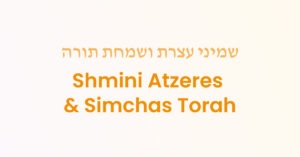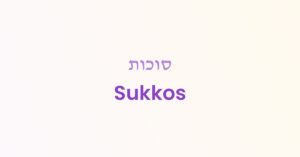This Sunday will be Hoshana Rabbah, the 7th day of Sukkos. Chazal teach us that even though Hashem sealed our judgement on Yom Kippur, our judgement is finalized on Hoshana Rabbah.1.
Chazal teach us that even though Hashem sealed our judgement on Yom Kippur, our judgement is finalized on Hoshana Rabbah.
So what can we do to make sure our final judgement comes out well?
We can find the answer hidden in the practice we do on Hoshanah Rabbah – we walk around in circles, banging the Aravos on the ground, and reciting special prayers. Why do we do this strange practice?
The Midrash2 teaches that each of the 4 species in the Lulav represents a different type of Jew, according to whether it tastes and/or smells good. For example, the Esrog tastes good and also smells good, so the Esrog represents the Jews who do many mitzvos and also learn a lot of Torah.
The Aravos don’t have any pleasant aroma and don’t taste good either, so the Aravos represent the Jews who are lacking in mitzvos and lacking in Torah.
After the lofty days of Rosh Hashanah and Yom Kippur, many of us can identify with this type of Jew. We tried to do a Cheshbon HaNefesh, identifying all the areas where we still need to improve. We tried to take on small commitments, but there are still so many areas where our mitzvah-observance is lacking. We might fall into despair when we realize that we are still so, so far from the person we are ultimately striving to be.
What else can we possibly do?
What else can we possibly do?
How can a Jew who is lacking in Torah and mitzvos possibly earn a good final judgment on Hoshana Rabbah?
The answer is hidden in the aravos themselves, whose leaves areshaped like a mouth, with two lips. The Sfas Emes3 explains that this symbolizes that the power of Hoshana Rabbah lies within our mouths – our words and our prayers.
The power of Hoshana Rabbah lies within our mouths – our words and our prayers.
Even the lowliest Jew can earn a favorable judgment on Hoshana Rabbah simply by using his mouth for beseeching Hashem to help in whatever areas he needs.
We might need help conquering our anger or developing our patience. We might need help with our Torah learning. We might need help breaking a bad habit that is destructive to ourselves and those around us. We might need help finding a good job that pays the bills. Everyone has different areas where they feel desperate for Hashem’s help.
This is the meaning of the phrase in Tehillim4: “Dalosi V’Li Yehoshee’a – I have become poor (Dal), and Hashem saved me.” After recognizing how very “poor” we are – lacking in spirituality as well as lacking in our physical needs – we turn to Hashem and beseech Him for help. When we recognize how very “poor” we are, and how we are desperate for Hashem’s help, Hashem comes to our aid, in the merit of this simple recognition.5
For this reason, Chazal instituted that we say many extra tefillos in the Hoshanah Rabbah service. Today, let’s remember the power of our prayers and beseech Hashem for everything we need, so that we can have an amazing, growthful new year.
Sources: [1] Zohar, Shlah, and Michtav Mei’eliyahu Vol. I. pg 269; [2] Vayikra Rabbah 30:11; [3] Sfas Emes: Sukkos 637 and 645; [4] Tehillim 116:6; [5] Sfas Emes: Sukkos 650
Your Challenge
Daven to Hashem for help in your own words. Ask for help in 2 things that you need help with spiritually, and 2 things that you need help with physically.
Ideally, this should be done on Hoshana Rabbah, but if you miss it on Hoshanah Rabbah, you can still do this challenge until the day after Sukkos.
FOR EXAMPLE:
- 2 Physical Needs: “Please help me be healthy this year, and please help me have enough money to cover my food and rent expenses.”
- 2 Spiritual Needs: “Please help me get angry less often, and please help me not bite my nails on Shabbos.”



